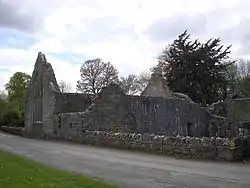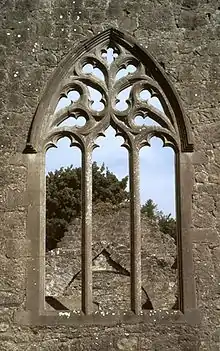Portumna Abbey
Portumna Abbey is a medieval Cistercian (and later Dominican) friary and National Monument located in Portumna, Ireland.[1][2][3][4]
Mainistir Phort Omna | |
 Ruins of the abbey church | |
 Location within Ireland | |
| Monastery information | |
|---|---|
| Other names | Portomna; Portompria |
| Order | Cistercian Order (1254–1414?) Dominican Order (1426–1711) |
| Established | 1254; refounded 1426, 1640 |
| Disestablished | c. 1582, 1698, 1711 |
| Mother house | Dunbrody Abbey (Cistercian era) |
| Diocese | Clonfert |
| People | |
| Founder(s) | Murchad Ó Madáin (1426) |
| Important associated figures | Ambrose Ó Madadhan Richard Ó Madadhan Anthony McHugo Ulick Burke, 3rd Earl of Clanricarde Patrick Sarsfield, 1st Earl of Lucan |
| Architecture | |
| Status | Inactive |
| Style | Late Gothic |
| Site | |
| Location | Portumna Demesne, Portumna, County Galway |
| Coordinates | 53.086087°N 8.217617°W |
| Visible remains | abbey church, cloister |
| Public access | yes |
| Official name | Portumna Abbey |
| Reference no. | 461 |
Location
Portumna Abbey is located 500 metres (550 yd) south of Portumna town centre, immediately east of Portumna Castle and on the north edge of Lough Derg.[5][6][7][8]
History
A chapel dedicated to Saints Peter and Paul was founded by Cistercian monks in 1254, dependent on Dunbrody Abbey, County Wexford.
The Cistercian foundation declined and was replaced with a Dominican friary dedicated to Saint Mary Assumed into Heaven, Peter and Paul, founded in 1426 by Murchad Ó Madáin of the powerful O'Madden lords of Síol Anmchadha.[9]
Portumna was dissolved c. 1582 and granted to Ulick Burke, 3rd Earl of Clanricarde.[10][11]
The friary was reestablished in 1640, with Ambrose Ó Madadhan the first prior. Richard Ó Madadhan was prior in 1691, when the friars were forced to flee after the Battle of Aughrim. Anthony McHugo was the prior when the Dominicans were formally expelled on 1 May 1698. Some remained and by the early 18th century they had reoccupied the priory. McHugo died there on 24 July 1711. The friars continued to live in the area, at Boula and at Gortanumera up to the 19th century.[12]
Part of the monastery was used as a Church of Ireland church in 1631. Patrick Sarsfield, 1st Earl of Lucan married Honora Burke here on 9 January 1689, in the midst of the War of the Two Kings.[13]
The choir was the local Church of Ireland place of worship between 1762 and 1810.[14]
Buildings

The church is 35 m (115 ft) long with nave and chancel separated by a tower. There is a large collection of medieval graveslabs and memorial plaques, and a piscinal.
On the northside is a cloister and sacristy, with some of the arcade reconstructed.[15]
References
- "Wild Geese Heritage Museum and Library, Portumna, Co. Galway, Ireland - Portumna Abbey". indigo.ie.
- "Portumna Abbey". dúchas.ie.
- Travel, D. K. (1 February 2013). "Back Roads Ireland". Dorling Kindersley Limited – via Google Books.
- Leask, Harold Graham (31 March 2018). "Irish Churches and Monastic Buildings". Dundalgan Press – via Google Books.
- "abbey ruins - Picture of Portumna Castle, Portumna - TripAdvisor". www.tripadvisor.ie.
- Salter, Mike (31 March 2018). "Abbeys and Friaries of Ireland". Folly Publications – via Google Books.
- Crowl, Philip Axtell (31 March 1990). "The Intelligent Traveller's Guide to Historic Ireland". Contemporary Books – via Google Books.
- Harbison, Peter (1 May 1975). Guide to the national monuments in the Republic of Ireland: including a selection of other monuments not in state care. Gill & Macmillan – via Internet Archive.
Portumna friary.
- http://portumna.galway-ireland.ie/portumna-abbey.htm
- "Portumna, Portumna Ireland, Portumna Galway Ireland". portumna.galway-ireland.ie.
- Fenning, Hugh (31 March 1972). "The undoing of the friars of Ireland: a study of the novitiate question in the eighteenth century". Publications universitaíres de Louvain – via Google Books.
- "Portumna Abbey".
- "Portumna Friary, Co Galway - Secret Ireland". www.secret-ireland.com.
- "The Parliamentary Gazetteer of Ireland: Adapted to the New Poor-law, Franchise, Municipal and Ecclesiastical Arrangements, and Compiled with a Special Reference to the Lines of Railroad and Canal Communication, as Existing in 1814-45". A. Fullarton and Company. 31 March 2018 – via Google Books.
- http://www.megalithicireland.com/Portumna%20Friary,%20Galway.html
